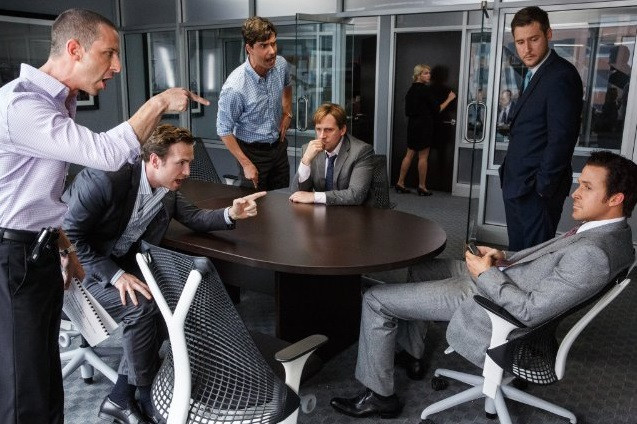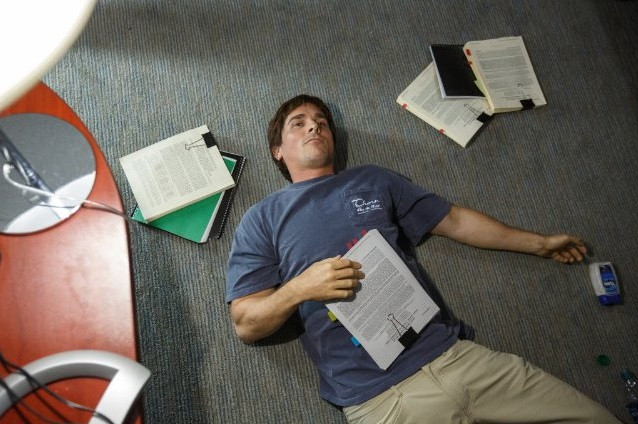The Big Short review: Christian Bale and Steve Carell star in Adam McKay's funny take on financial crisis

Adam McKay directs Steve Carell, Ryan Gosling, Christian Bale and the rest of a star-studded ensemble cast in surprisingly light-hearted and entertaining The Big Short. However, if you're not well versed in the world of finances, the clunky narrative and barrage of banking jargon might have you nursing a headache after a first viewing.
Based on the true events (and Michael Lewis's best-selling book of the same name) of the US housing bubble collapse of the mid-2000s, the film focuses on the three different accounts of the "weirdos and outsiders" who saw it coming before anybody else did. With their calculated predictions, each group decide to take on the big banks for their greed and lack of foresight in the run-up to the collapse and become hellbent on finding a way to make profit out of the companies' inevitable failings.
The man who predicts the crisis first is hedge fund manager Michael Burry (Bale), whose oversized tees, scruffy hair and bare feet don't exactly scream mathematical mastermind. Nevertheless, he waltzes into some of the biggest banks in New York and successfully demands to buy mortgage bonds after discovering that their own foundations have been laid in a silty morass of debt.
Confident they will skyrocket in value in just a few years, he brokers over $1bn (£686m) worth, and the excessive amount soon becomes the talk of the banking world, with news finding its way to smug and flashy banker Jared Vennett (Gosling).

The story really gets going when Vennett investigates the reason behind such huge sales and discovering Burry's motives, entices cynical hedge funder Mark Baum (Carell) and his associates to buy bonds too. Elsewhere, aspiring Wall Street hopefuls Jamie Shipley and Charlie Geller stumble across Burry's mission plans and start making some deals of their own with the banks. Respective actors Finn Wittrock and John Magaro provide much of the film's funny moments as the young rookies who are so often one step behind the best in the biz.
With a running time of 130 minutes, the film feels a little bloated but all it packs into that two hours and 10 minutes is nonetheless impressive. The narrative moves fast, and to help the audience follow the speedy momentum and often confusing dialogue, uber-spray-tanned, self-inflated Vennett frequently breaks the fourth wall to explain financial lingo.
It's clear screenwriters Charles Randolph and McKay tried at every opportunity to make the subject matter easy for their viewers to digest, with scenes using Jenga to demonstrate how fragile the economy is or onscreen graphics with the definitions of words. At some points, they even employ guest stars such as a bubble-bathing Margot Robbie, chef Anthony Bourdain and Selena Gomez to stop the film and break the terms down.
Unfortunately, the process comes across patronising at times as the film tries to "dumb down" what it claims at the beginning is easy to understand. Fact of the matter is, it isn't, and towards the end of the movie when you release, you're just not set out for a career on Wall Street, it can't help but make you feel a little inferior.
There's admirability to be found in its attempt at being different, though. Occasionally throughout the film, some characters take a leaf out of Gosling's book and talk directly to the audience explaining how the film deviates from the real truth of the story. It's a technique very rarely done on the big screen and while occasionally jarring, it does help to split up what would be a fairly heavy and cynical movie.
It's unexpectedly artistic too, rolling out plenty of great montages setting the scene of each year and with an imposing but often funky and time-appropriate soundtrack.

Visually, the movie excels, constantly juxtapositioning the tight space of a desk and modest office space to the swanky skyscraper banking buildings that permeate Manhattan. Set between 2005 and 2008, there's nostalgia to be felt in the clothes and the look of the piece and helps to maintain that sense of familiarity you feel when the characters are talking straight to the camera.
Which helps, seeing as most of the characters aren't necessarily likeable - a lot of them are working in finance after all. Never do they border on the garish caricature-like representation of stockbroker Jordan Belfort in The Wolf Of Wall Street who was hard to empathise with though. Gosling comes close, but he's never allowed the screen-time to go "full douchebag" and therefore remains humorous throughout rather than irritating.
His well-balanced treatment is evidenly the work of McKay, whose best known film is Anchorman: The Legend Of Ron Burgundy. Perhaps not the most obvious choice of director for a film about the financial crisis of 2008, the film-maker certainly knows how to get a few laughs and most importantly when they're up for grabs, and its shown here.
Some characters do have redeeming qualities, though, and anchor some heart into what is essentially a film about corruption and greed. Particular parallels are drawn between Carell's anti-authoritarian Baum and retired banker Ben Rickert (Brad Pitt), who wants nothing more to do with the corrupt world of finance.
Baum struggles with the morality of the industry he's in and constantly questions what is right and what's wrong. His feeling this way is explained briefly, yet touchingly, through an admission of a family loss that hits almost as hard as the economy falls.
There's no doubt that it's the actors' performances that carry the film to the award-nominated heights its been reaching as of late. But despite all the praise for Bale, who does indeed to a stellar job, it's Carell who shines brightest.
© Copyright IBTimes 2025. All rights reserved.






















